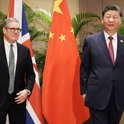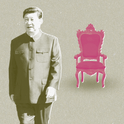There you are at the bus stop in Moscow, shuffling your feet in the freezing slush and thinking of having a quick cigarette to pass the time. Surprisingly, since we tend to think of Russians as having a shot of vodka in one hand and a cigarette in the other, acting on that thought is going to prove quite difficult.
In Russia, you are now only allowed to smoke in designated outdoor areas and cigarettes are no longer sold at news kiosks. They are neither advertised nor publicly displayed in the diminishing number of places that still stock them and the warnings on the packets are big and stark. A packet of Marlboro Reds now costs 110 roubles (£1.10)—a small sum by western standards, but it represents a price rise for foreign cigarettes of 20 per cent in the last year.
So, you wonder whether you should contribute to Russia’s smoking cessation figures (which, if believed, show that the number of Russians who smoke is down 17 per cent over the past year, though a whopping 43 per cent of the population still smokes) when suddenly the decision is made for you. You glance at the bus stop billboard and there is a lurid anti-smoking advert from the Russian Ministry of Health (a recent Moscow poster of President Barack Obama, with the slogan that smoking kills more people than he does, appears to have been a prank). Resolved at last to ditch the filthy American habit and stride forward as a healthy, chest-bearing, horse-riding citizen of Vladimir Putin’s glorious Russia, you board the bus.
At least, that’s the idea.
Senator Sergei Kalashnikov, formerly of the Duma Health Committee, insists, in a voice that suggests he may have smoked the odd cigarette himself over the years: “The anti-smoking propaganda is working. Russians are beginning to understand that smoking is not civilised.” He may have a point. Polls show there is 90 per cent compliance and 80 per cent approval of the new laws, which were implemented in 2013/14 and strictly adhere to World Health Organisation (WHO) guidelines.
This in a country that has been smoking enthusiastically since the 16th century. As the story goes, in 1533 an English trade ship was caught in a storm and forced to anchor off the coast of Ivan the Terrible’s Muscovy. The ship was carrying tobacco, which the Russians took to immediately. True, Tsar Nicholas I later tried a Putin-style ban in streets, squares and public places but his son, Alexander II, swiftly overturned them when he came to power in 1855. Lenin had a brief bash at restrictions but was obstructed—by medical health professionals.
Soviet Russians smoked their beautifully branded and packaged cigarettes (the gorgeous Belamorkanal and Kosmos packs that are now design classics) like there was no tomorrow (as for so many Russians there wasn’t). Army rations included cigarettes until recently, and the first Soviet anti-smoking legislation came into force as late as 1980, pitched as a health concern but in fact fuelled by a tobacco shortage and doomed to failure. There were queues, fights and a huge black market that even dealt in discarded butts. By the early 1990s, Russian tobacco was replaced by Big International Tobacco and the shortages were no more.
It is the fact that the tobacco industry in Russia is 95 per cent foreign that has made smoking a relatively easy target for Putin. For the anti-smoking campaign has not been the kind of mammoth PR exercise that it might have been in the west; it has been simpler than that. This is because Prime Minister Dmitry Medvedev backs it personally. Those who helped draft the anti-smoking legislation acknowledge that if the Presidential Administration gives the nod, the laws pass. “But if Putin backed it,” explains Anton Nossik, a political blogger, “smokers would be lynched in the streets.”
Though it’s true that the tobacco producers are foreign (Japan Tobacco International, Philip Morris International, British American Tobacco and Imperial Tobacco together control 90 per cent of the $16bn—£11.3bn—Russian cigarette market) they produce a huge amount of revenue for the Russian Finance Ministry. WHO reports suggest that if Russia raised its tax rate to 70 per cent of retail price, as recommended and eventually planned, tax revenue would increase by over 300 per cent. However, in the last nine months of 2015 the tobacco market fell by 5.7 per cent and Japan Tobacco intends to close its Moscow factory this year due to a “serious contraction” in the market. They have also started limiting their portfolio of brands. Japan Tobacco has merged Nasha Prima and Magna with More, and Wings with LD.
So, successes notwithstanding, the idea of anti-smoking being a clean-living Russian idea is almost as absurd as it sounds. It is American in both concept and funding. But, as relations with the west have soured, committees established under an agreement reached by Obama and Medvedev, then Russian President, in 2009, have changed their names and structure so as to slip under the anti-western radar and, though consultations continue, they have become more or less invisible (“walking on eggshells” and “walking on a knife edge” are phrases that come up a lot).
Whatever Putin would have us think, the anti-smoking movement is still heavily funded by former New York Mayor, billionaire Michael Bloomberg’s charitable foundation, among others, under the Russian Ministry of Health aegis. One American combatting smoking in Russia told me: “The Ministry of Health is a brand people can trust.” “They are very keen for this to seem like a domestic initiative. The MOH sees this as one of their major achievements, which has raised their profile within the government and internationally. The government has become a model in this area with delegations coming from China to copy the strategy.” Indeed, Gurbanguly Berdymukhamedov, the President of Turkmenistan, banned tobacco completely in January.
Bloomberg-funded as it may be, there is a feeling that “Putin gets it.” Russian men die 12 years earlier than their western counterparts. Another anonymous American insider source told me: “The General Staff is terrified by Russia’s demographic train wreck. There aren’t enough soldiers and there aren’t going to be enough soldiers. The number of 18-year-old men is half what it was 20 years ago and there aren’t enough young women to make more of them. Improving the nation’s health is a real issue for this reason alone.”
Yet the means are strangely Soviet in tone. People are encouraged to inform on cafe and restaurant owners who flout the new laws via a hotline and you can even be vetted and authorised to become an informant, seeking out wily smokers in unauthorised places. An impressive 60m people broke the law last year, earning the government 100m roubles in fines, according to Andrei Loskutov of the Russian Cigar Union, who is Executive Director of the All-Russia Smokers’ Rights Movement.
Loskutov explained: “This anti-smoking thing is a little present from you in the west. Thanks a lot. Now 40m tax-paying, law-abiding Russians who want to smoke have become criminals. The argument that cigarettes are made by western companies is ridiculous at this point—you think the smoker would prefer his cigarette if it’s Russian? The government needs a psyciatrist—it is taxing smokers and spending that money trying to get them to stop! In the USSR the government used its money for real work—housing, railways, space rockets. The anti-smoking campaign is a way for people to make money from American funding. Anyway, in the 30 years since the international anti-smoking campaign began, 15 people a minute have taken it up. People want to smoke.”
People may want to smoke but, with higher taxes and even more stringent restrictions in the pipeline, Putin and his unlikely allies are determined to stop them.
Read more by Anna Blundy: Hoping that you're wrong

Women smoke cigarettes at a shopping center in Moscow, Russia ©Misha Japaridze/AP/Press Association Images
Putin's soviet anti-smoking campaign
Cigarette prices are rising but smokers are fighting back
March 24, 2016












